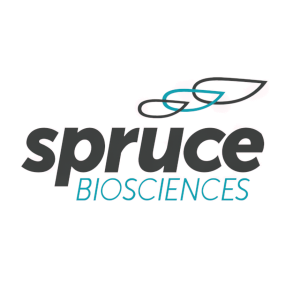Spruce Biosciences Announces Publication of Phase 2 Results for Tildacerfont in Journal of Clinical Endocrinology and Metabolism
Spruce Biosciences (Nasdaq: SPRB) has published results from two Phase 2 clinical studies of tildacerfont for treating classic congenital adrenal hyperplasia (CAH). The studies demonstrated tildacerfont's ability to significantly reduce key hormone levels, including ACTH and androstenedione, particularly in patients with poor disease control. In 60% of cases, normalization of ACTH was observed. The findings support ongoing late-stage trials (CAHmelia-203 and CAHmelia-204) aimed at further assessing tildacerfont's efficacy and its potential to reduce glucocorticoid dosage.
- 60% of patients in poor disease control normalized ACTH levels with tildacerfont.
- Tildacerfont maintained hormone levels near normal in patients with good disease control.
- Generally safe and well-tolerated across 171 patients in multiple trials.
- None.
Insights
Analyzing...
Spruce Biosciences, Inc. (Nasdaq: SPRB), a late-stage biopharmaceutical company focused on developing and commercializing novel therapies for rare endocrine disorders with significant unmet medical need, today announced the publication of the results from two Phase 2 clinical studies investigating tildacerfont in adult patients with classic CAH in the Journal of Clinical Endocrinology and Metabolism.
“The data published in the Journal of Clinical Endocrinology and Metabolism demonstrates the potential of tildacerfont to reduce androgen excess without increasing the total daily glucocorticoid dose in patients with classic CAH,” said Kyriakie Sarafoglou, MD, Associate Professor, Department of Pediatrics – Divisions of Endocrinology and Genetics & Metabolism at the University of Minnesota Medical School.
SPR001-201 was an open-label, multi-dose, Phase 2a dose-escalation study which evaluated the ability of tildacerfont to lower adrenocorticotropic hormone (ACTH), 17-hydroxyprogesterone (17-OHP), and androstenedione (A4) at doses ranging from 200mg daily to 1,000mg daily in patients with congenital adrenal hyperplasia due to 21-hydroxylase deficiency. SPR001-202 was an open-label, 12-week Phase 2a clinical trial, which assessed the ability of a daily dose of 400mg of tildacerfont to lower ACTH, 17-OHP, and A4 over a 12-week dosing period. SPR001-201 and SPR001-202 comprised the entire Phase 2a clinical development program for tildacerfont in adult classic CAH. In the studies, efficacy was evaluated by changes from baseline in ACTH, 17-OHP, and A4 according to baseline A4 ≤2x upper limit of normal (ULN), denoted as baseline good disease control, or A4 >2x ULN, denoted as baseline poor disease control. Safety was evaluated using adverse events and laboratory assessments.
The results of the studies showed that tildacerfont reduced key hormone biomarkers towards normal levels in the baseline poor disease control group, including normalization of ACTH and A4 in
“Classic CAH is a serious and potentially life-threatening condition that has not benefited from new effective treatment options in approximately 50 years,” said Rosh Dias, M.D., MRCP, Chief Medical Officer of Spruce Biosciences. “People living with classic CAH must grapple with the difficult balance of managing their adrenal androgen excess and supraphysiologic dosing of glucocorticoids, the existing standard of care therapy. In our Phase 2a studies, I was pleased to see that tildacerfont was able to produce meaningful reductions in highly elevated hormones in classic CAH patients, including in some cases normalization of these hormones, over a 12-week period without increases to daily steroid doses. This has not been reported to date with any other investigational product candidate.”
About Tildacerfont
Tildacerfont is a potent and highly selective, non-steroidal, oral antagonist of the CRF1 receptor, which is the receptor for corticotropin-releasing factor (CRF), a hormone that is secreted by the hypothalamus. The CRF1 receptor is abundantly expressed in the pituitary gland where it is the primary regulator of the HPA axis. By blocking the CRF1 receptor, tildacerfont has the potential to address the uncontrolled cortisol feedback regulatory pathway in CAH, and in turn reduce the production of ACTH in the pituitary, limiting the amount of androgen produced downstream from the adrenal gland. Tildacerfont has been evaluated in 171 patients across seven clinical trials in which it has been generally well tolerated. No drug-related serious adverse events have been reported related to tildacerfont treatment.
About Spruce Biosciences
Spruce Biosciences is a late-stage biopharmaceutical company focused on developing and commercializing novel therapies for rare endocrine disorders with significant unmet need. Spruce is initially developing its wholly owned product candidate, tildacerfont, as the potential first non-steroidal therapy for patients suffering from classic congenital adrenal hyperplasia (CAH). Classic CAH is a serious and life-threatening disease with no known novel therapies approved in approximately 50 years. Spruce is also developing tildacerfont for women suffering from a rare form of polycystic ovary syndrome (PCOS) with primary adrenal androgen excess. To learn more, visit www.sprucebiosciences.com and follow us on Twitter @Spruce_Bio, LinkedIn, Facebook and YouTube.
Forward-Looking Statements
Statements contained in this press release regarding matters that are not historical facts are “forward-looking statements” within the meaning of the Private Securities Litigation Reform Act of 1995. Such forward-looking statements include statements regarding, among other things, the results, conduct, progress and timing of Spruce’s clinical trials. Because such statements are subject to risks and uncertainties, actual results may differ materially from those expressed or implied by such forward-looking statements. Words such as “potential”, “demonstrates”, “may” and similar expressions are intended to identify forward-looking statements. These forward-looking statements are based upon Spruce’s current expectations and involve assumptions that may never materialize or may prove to be incorrect. Actual results could differ materially from those anticipated in such forward-looking statements as a result of various risks and uncertainties, which include, without limitation, risks and uncertainties associated with Spruce’s business in general, the impact of the COVID-19 pandemic, and the other risks described in Spruce’s filings with the U.S. Securities and Exchange Commission. All forward-looking statements contained in this press release speak only as of the date on which they were made and are based on management’s assumptions and estimates as of such date. Spruce undertakes no obligation to update such statements to reflect events that occur or circumstances that exist after the date on which they were made, except as required by law.
View source version on businesswire.com: https://www.businesswire.com/news/home/20210621005255/en/







